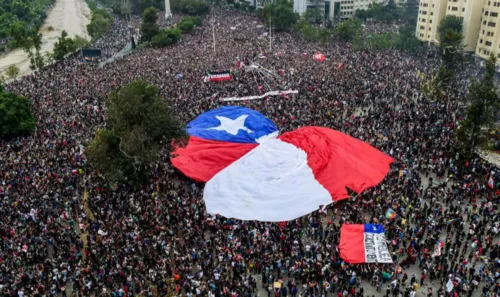
The Chilean population rejected the “more conservative” proposal, which was the second presented after the opening of a Constituent Assembly, of the new Constitution voted on this Sunday (17/12).
With 96.30% of the votes counted, 55.76% of voters were against, while 44.24% were in favor of the document prepared by the Constitutional Council, last May. The result was already irreversible. According to Chilean authorities, around 15 million citizens were eligible to vote in the plebiscite
Being mandatory in the country, voting began at 8 am and ended at 6 pm, local time, continuing the vote count.
According to the general picture (national and international), in the first hour, 3,168 polling stations out of a total of 39,728 had been counted, corresponding to 7.97%%. In this context, 45.70% of the votes were in favor, while 54.30% were against. According to the Chilean press, a very different scenario to the previous vote, when in the same period of time, the majority rejected the text.
This constitutes, therefore, the second rejection of the document that aims to abandon the Magna Carta in force since 1980 to the present day, imposed by Augusto Pinochet during his dictatorial regime that extended from 1973 to 1990.
The disapproval of the first text took place on September 4, 2022, when the polls indicated 62% of valid votes for “rechazo” and 38% for “apruebo”.
With tonight’s result, the Chilean population discards a reformulated project that was the target of strong criticism for continuing to maintain dictatorial remnants and removing some of the few social rights guaranteed by the current Constitution, since the text was developed by a council elected with broad majority of far-right representatives.
The proposal in question was made up of 17 chapters, 216 articles and 62 transitional provisions, being longer than the current Constitution, which has 15 chapters and 161 permanent norms. On the other hand, smaller than the text rejected last year, which contained 11 chapters, 388 permanent articles and 57 transitional articles.
Regarding the formation of a new plebiscite on the subject, the president of Chile, Gabriel Boric, ruled out any possibility during his term, which ends in 2026.
Boric: ‘the constitutional process ends’
After the result, Chilean President Gabriel Boric recognized the victory of rejecting the new proposal, but maintained a neutral stance, stating that “those who triumph in an election cannot ignore those who are circumstantially defeated”.
Right at the beginning of the speech, the Chilean leader, once again, ruled out the possibility of a new plebiscite: “I clarify that, during our mandate, the constitutional process ends. The emergencies are different.”
These “urgencies” mentioned by the president refer to the advancement of reforms proposed by his government, which are premises for the “solutions that Chile needs in social, economic and security matters”.
“None [votação] managed to represent and unite Chile, in its beautiful diversity. The country became polarized, divided and, despite this resounding result, the constitutional process was unable to channel the hopes of having a new Constitution drawn up for everyone. Politics has been indebted to Chile and this debt is paid by reaching the solution that Chileans need and demand from us”, stated Boric.
‘Today we will sleep peacefully’
Even before the final result, the president of the Unión Demócrata Independiente (UDI), Javier Macaya, had recognized the victory of “el contra” in the text: “today we will sleep peacefully […] Chileans are tired of the constitutional issue. Our response now is to be consistent, coherent and respectful of the democratic decision of this day. It is important that everyone recognizes the chapter.”
The president of Democracia Chilena (DC), Alberto Undurraga, celebrated the numbers: “there were many reasons to be against it. Chile needs a season of agreements, and this would only be possible by voting against. Now we need to forge agreements on all matters of interest to the people.”
When considering the text as “ideological”, deputy Leonardo Soto, from the Socialist Party (PS), took the progressive victory for granted: “The results are consolidated, there is already a lot of clarity that Chile has made a decision, by a higher percentage We expected a much closer decision than we expected, but there is practically a 10 point difference between the result.”
Source: www.brasildefato.com.br

